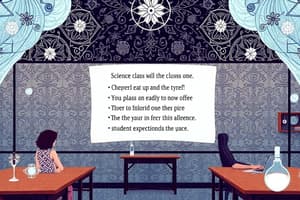Podcast
Questions and Answers
You should use towels or cotton gloves when inserting glass tubing into or removing it from a rubber stopper.
You should use towels or cotton gloves when inserting glass tubing into or removing it from a rubber stopper.
True (A)
Fill wash bottles only with _________ water.
Fill wash bottles only with _________ water.
distilled
What should you do if a piece of glassware becomes 'frozen' in a stopper?
What should you do if a piece of glassware becomes 'frozen' in a stopper?
- Take it to your instructor for removal (correct)
- Heat it with a burner
- Try to pull it out yourself
- Leave it as it is
Hot and cold glass have the same visual appearance.
Hot and cold glass have the same visual appearance.
When removing an electrical plug, you should grasp the _______.
When removing an electrical plug, you should grasp the _______.
Students may perform laboratory activities without a signed safety contract.
Students may perform laboratory activities without a signed safety contract.
What should you do if you notice damaged electrical equipment?
What should you do if you notice damaged electrical equipment?
Before using glassware, you should examine it for:
Before using glassware, you should examine it for:
What should you do when using knives and other sharp instruments?
What should you do when using knives and other sharp instruments?
It is safe to eat food and drink beverages in the laboratory.
It is safe to eat food and drink beverages in the laboratory.
What must you do if you do not understand how to use a piece of equipment?
What must you do if you do not understand how to use a piece of equipment?
Always work in a ______ area.
Always work in a ______ area.
Match the following safety practices with their descriptions:
Match the following safety practices with their descriptions:
It is acceptable to return unused chemicals to their original containers.
It is acceptable to return unused chemicals to their original containers.
What should you do if a chemical splashes in your eye?
What should you do if a chemical splashes in your eye?
What will happen if you violate safety rules in the laboratory?
What will happen if you violate safety rules in the laboratory?
Flashcards are hidden until you start studying
Study Notes
Safety Procedures in the Science Classroom
- Science classes involve hands-on activities with hazardous materials; safety is the highest priority.
- A student safety contract must be signed by students and guardians to participate in laboratory activities.
Recognizing Safety Equipment
- Be familiar with the locations and usage of safety equipment: first aid kit, eye wash station, safety shower, fire extinguisher, fire blanket, and alarms.
- Know the emergency exits and fire drill procedures before beginning lab work.
Clothing and Personal Protection
- Always wear laboratory goggles during activities involving chemicals, heat, or glassware.
- Secure long hair, avoid loose clothing and dangling jewelry; closed-toe shoes are mandatory.
- Lab aprons must be worn at all times for protection against spills and splashes.
Laboratory Conduct
- Responsibility and attentiveness are crucial; never work alone without an instructor present.
- Avoid eating, drinking, or using laboratory glassware for food or beverages.
- Horseplay, pranks, and distractions are strictly prohibited in the lab environment.
Chemical Handling Guidelines
- Chemicals must be accessed and handled with care; never return unused chemicals to their containers.
- Use proper techniques for handling acids; always add acid to water, not the reverse.
- Wafting vapors is the appropriate method to smell chemicals safely.
Working with Glassware and Equipment
- Handle glassware with care; use a brush and dustpan for broken glass and place it in designated containers.
- Always lubricate glass tubing to avoid breakage when inserting into stoppers.
- Use heat-resistant materials to handle hot apparatus; never place hot glass directly on a surface.
Emergency Procedures
- Report all accidents, no matter how small, to the instructor immediately.
- If exposed to chemicals, flush the affected area with running water for at least 20 minutes and seek assistance.
- In cases of fire, ensure containers are closed and equipment is turned off following safety protocols.
Student Agreement
- Students acknowledge understanding and committing to safety rules; violation may lead to disciplinary actions, including removal from the lab.
- The teacher will provide instructions on all safety procedures and handling techniques before laboratory activities.### Electrical Safety in the Laboratory
- Always grasp the plug, not the electrical cord, when removing it from a socket to avoid damage and ensure safety.
- Ensure hands are completely dry before touching any electrical switch, plug, or outlet to prevent electrical shock.
Glassware Safety
- Inspect glassware before each use for any damage such as chips or cracks; damaged glassware should not be used.
- Dirty glassware must not be utilized as it can lead to contamination and invalid results in experiments.
Reporting Equipment Issues
- Report any damaged electrical equipment immediately to ensure a safe laboratory environment.
Parental Awareness
- Parent or guardian consent is required for students participating in laboratory activities.
- Parents/guardians must be aware of any allergies the student may have that could affect laboratory work.
Reproduction Rights
- Permission is granted to science teachers who are customers of Flinn Scientific, Inc., for reproduction of material for educational purposes, while restrictions apply to other types of reproduction without written consent.
Studying That Suits You
Use AI to generate personalized quizzes and flashcards to suit your learning preferences.




